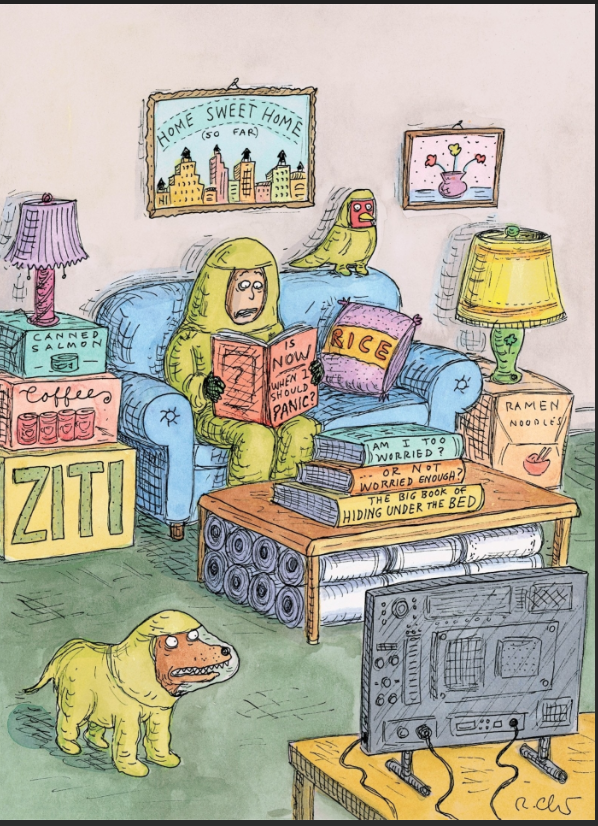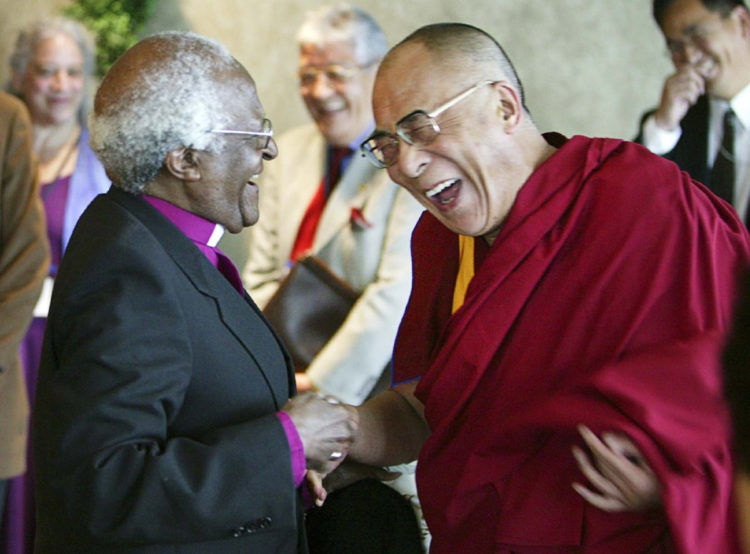I wake up most mornings vowing to be positive, but itãs hard to maintain a positive mindset when itãs bitter cold out, eliminating a walk, and when contacts with friends and family are relegated to phone calls and Zoom.ô The longing for in-person contacts sends my positive intentions out the window.

On a bad day I might be consumed with worry like in this Roz Chast cartoon
It became clear that I needed an approach that involved more than willing positive thoughts.
I needed a comprehensive plan to stay the course.ô I goggled ãhappiness,ã and landed on a study by Laurie Santos, a Yale psych professor, who discovered that ãhappiness gives us the resilience to get through hard times,ã with the caveat that happiness has to be realistic, taking into account our fears and anxieties. Thatãs a big incentive: becoming more resilient.
As I thought more deeply about cultivating happiness I was reminded of how Viktor Frankl, author of Manãs Search for Meaning, discovered meaning in an unimaginable circumstance: a Nazi concentration camp. My lockdown is small potatoes by comparison.

I recognize that when Iãm involved in a meaningful project like, teaching, writing, or progressive politics, my mood is lighter.ô I feel more connected to the larger world, even during Covid.ô Note to self: always have a project at the ready, even something as small as de-cluttering my kitchen cabinets.
To further immerse myself in my personal happiness project, I consulted The Book of Joy, which focuses on a conversation between the Dalai Lama and Archbishop Desmond Tutu.ô
The big take away from this book is that we feel joy when we stop focusing on our own miserable state and shift our perspective to the experience of others.ô A good argument for volunteer or social justice work.ô I will never forget hearing a long time Hospice volunteer say, ãI get so much out of this work. I canãt imagine my life without it.ãô (Note: she was genuinely happy.)

Desmond Tutu and the Dalai Lama, practicing what they preach, enjoying a joyful exchange
The Book of Joy describes ãthe pillars of joy,ã which are divided into ãqualities of the mindã and ãqualities of the heart.ãô The mind category includes: ô perspective (Stop obsessing over my lockdown blues), humility (Iãm not the center of the universe), humor (Fortunately I can laugh at myself) and acceptance ô (This one needs some work.)
For Desmond Tutu acceptance amounts to facing oneãs difficulties and asking oneself, ãHow can I use this as a positive experience?ãã For me, it means deepening my spiritual practice with a focus on meditation and inspirational readings.

A spiritual teaching of the Dalai Lama’s I try to practice, which promotes a happy heart
The four qualities of the heart are: forgiveness, gratitude, compassion, and generosity. The Dalai Lama calls forgiveness liberating.
Iãve experienced this when Iãve been able to forgive people in my life who have been hurtful. Can I find a way to forgive Trump and his supporters?ô Not readily, but if I try to understand the economic desperation that fuels the Proud Boys, I may get somewhere.
I do fairly well with gratitude and even generosity, but when it comes to compassion for myself, I flunk.ô If I up my self compassion, by not beating myself up for all I havenãt accomplished in my Covid procrastination, and focus on what Iãve been able to do, Iãll be happier.

One way I practice self-compassion is to imagine myself surrounded by a healing light.
Iãve discovered music is wonderful for enhancing my mood. I love listening to Mozart, Ella, and The Uppity Blues Women. To paraphrase the famous neurologist, Oliver Sachs, ãThe two best natural therapies for happiness are music and gardening.ã
In the ã70sô TV series “The Bob Newhart Show,” Newhart played a psychiatrist. ô In one episode he screamed, ãStopã when a patient uttered a negative thought.
As crude as it appears, I think there is merit to the Newhart approach, where you erect mental roadblocks when dark thoughts invade your thinking.ô To take Newhartãs approach further, say ãStop,ã when negative thoughts intrude, but follow with positive thoughts, like feeling gratitude for a call from an adult child or a warm house.






